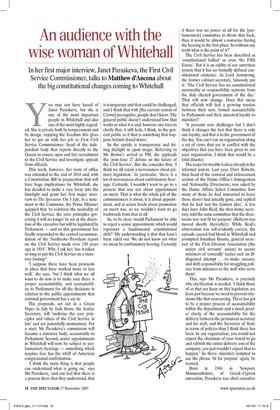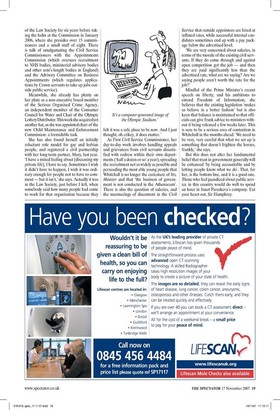An audience with the wise woman of Whitehall
In her first major interview, Janet Paraskeva, the First Civil Service Commissioner, talks to Matthew d'Ancona about the big constitutional changes coming to Whitehall you may not have heard of Janet Paraskeva, but she is one of the most important people in Whitehall and also one of the most highly regarded. She is private both by temperament and by design, enjoying the freedom this gives her to get on with her job as First Civil Service Commissioner: head of the independent body that reports directly to the Queen to ensure open and fair recruitment to the Civil Service and investigate appeals from officials.
This week, however, her term of office was extended to the end of 2010 and, with a Constitution Bill in preparation that will have huge implications for Whitehall, she has decided to make a rare foray into the limelight and grant her first major interview to The Spectator. On 3 July, in a statement to the Commons, the Prime Minister quipped that 'to reinforce the neutrality of the Civil Service, the core principles governing it will no longer be set at the discretion of the executive but will be legislated by Parliament — and so this government has finally responded to the central recommendation of the Northcote–Trevelyan report on the Civil Service made over 150 years ago in 1854'. Why, I ask her, has it taken so long to put the Civil Service on a statutory footing?
'I suppose there have been protocols in place that have worked more or less well,' she says, 'but I think what we all want to do now is to make sure there is proper accountability, and accountability to Parliament for all the decisions in relation to the public appointments that national government has a say in.'
The proposals, set out in a Green Paper in July by Jack Straw, the Justice Secretary, will 'enshrine the core principles and values of the Civil Service in law' and are potentially momentous. For a start, Ms Paraskeva's commission will become a statutory body, accountable to Parliament. Second, senior appointments in Whitehall will now be subject to parliamentary hearings — something which sceptics fear has the whiff of American congressional confirmation.
'I think the main thing is that people can understand what is going on,' says Ms Paraskeva, 'and can feel that there is a process there that they understand, that is transparent and that could be challenged, and I think that with [the current system of Crown] prerogative, people don't know. The general public doesn't understand how that works or what it is and, however one tries to clarify that, it still feels, I think, to the general public as if that is something that happens behind closed doors.'
So the upside is transparency and letting daylight in upon magic. Referring to Mr Brown's arrival as PM, she applauds the 'post-June 27 debate on the future of the Civil Service'. But she concedes that, 'I think we all retain a nervousness about primary legislation.' In particular, 'there is a lot of nervousness about confirmatory hearings. Certainly, I wouldn't want to go to a process that was not about appointment on merit. That is what the whole job of the commissioners is about, it is about appointment, and at senior levels about promotion on merit too, so we wouldn't want to go backwards from that at all.'
So, to be clear: would Parliament be able to reject a senior appointment, which would represent a fundamental constitutional shift? 'My understanding is that that hasn't been ruled out. We do not know yet what we mean by confirmatory hearing. Certainly if there was no power at all for the [parliamentary] committee to throw that back, then it would be almost a nonsense having the hearing in the first place. So without any teeth what is the point of it?'
The Civil Service has been described as 'constitutional ballast' or even `the Fifth Estate'. But it is an oddity of our unwritten system that it has no formally defined constitutional existence. As Lord Armstrong, the former cabinet secretary, famously put it: 'The Civil Service has no constitutional personality or responsibility separate from the duly elected government of the day.' That will now change. Does this mean that officials will feel a growing tension between their new, formal accountability to Parliament and their ancestral loyalty to ministers?
'It presents new challenges but I don't think it changes the fact that there is only one loyalty, and that is to the government of the day. You can't run an organisation along a set of views that are in conflict with the objectives that you have been given to run your organisation. I think that would be a total disaster.'
The scope for trouble is clear already in the informal system. Last year, Dave Roberts, then head of the removal and enforcement section of the Home Office's Immigration and Nationality Directorate, was asked by the Home Affairs Select Committee how many of those he had instructed to leave these shores had actually gone, and replied that he had 'not the faintest idea'. A few days later John Reid, the then home secretary, told the same committee that the directorate was 'not fit for purpose' (Roberts was moved shortly thereafter). While Reid's observation was self-evidently correct, the episode caused bad blood in Whitehall and prompted Jonathan Baume, general secretary of the First Division Association (the senior civil servants' union) to accuse ministers of 'cowardly' tactics and 'an illdisguised attempt . . . to make excuses, and shift responsibility for struggling policies from ministers to the staff who serve them'.
This, says Ms Paraskeva, is precisely why clarification is needed. 'I think those of us that are keen on this legislation are keen just because we need to prevent situations like that reoccurring. There has got to be a proper process of accountability within the department and a much greater clarity of the accountability for the delivery between the permanent secretary and his staff, and the Secretary of State in terms of policies than I think there has been. In any organisation, you would not expect the chairman of your board to go and rubbish the entire delivery arm of the company, you just wouldn't expect that to happen.' So there ministers tempted to use the phrase 'fit for purpose' again, be warned.
Born in 1946 in Newport, Monmouthshire, of Greek–Cypriot extraction, Paraskeva was chief executive of the Law Society for six years before taking the helm at the Commission in January 2006, where she presides over 15 commissioners and a small staff of eight. There is talk of amalgamating the Civil Service Commissioners with the Appointments Commission (which oversees recruitment to NHS bodies, ministerial advisory bodies and other arm's-length bodies in England) and the Advisory Committee on Business Appointments (which regulates applications by Crown servants to take up jobs outside public service).
Meanwhile, she already has plenty on her plate as a non-executive board member of the Serious Organised Crime Agency, an independent member of the Consumer Council for Water and Chair of the Olympic Lottery Distributor. This week she acquiredyet another hat, as she was appointed chair of the new Child Maintenance and Enforcement Commission: a formidable task.
She has also found herself an initially reluctant role model for gay and lesbian people, and registered a civil partnership with her long-term partner, Mary, last year. 'I have a mixed feeling about [discussing my private life], I have to say. Sometimes I wish it didn't have to happen, I wish it was ordinary enough for people not to have to comment — but it isn't,' she says. 'Actually it was in the Law Society, just before I left, when somebody said how many people had come to work for that organisation because they felt it was a safe place to be now. And I just thought, oh crikey, it does matter.'
As First Civil Service Commissioner, her day-to-day work involves handling appeals and grievances from civil servants dissatisfied with redress within their own departments (half a dozen or so' a year), spreading the recruitment net as widely as possible and persuading the most able young people that Whitehall is no longer the caricature of Yes, Minister and that 'the business of government is not conducted in the Athenaeum'. There is also the question of salaries, and the murmurings of discontent in the Civil Service that outside appointees are hired at inflated rates, while successful internal candidates sometimes end up with a pay package below the advertised level.
'We are very concerned about salaries, in terms of the morale of the existing civil servants. If they do come through and against open competition get the job — and then they are paid significantly less than the advertised rate, what are we saying? Are we saying people aren't worth the rate for the job?'
Mindful of the Prime Minister's recent speech on liberty, and his ambitions to extend Freedom of Information, she believes that the existing legislation 'makes us behave in a better fashion' but is also keen that balance is maintained so that officials can give frank advice to ministers without it being released a few weeks later. This is sure to be a serious area of contention in Whitehall in the months ahead. 'We need to be very, very careful that what we set up is something that doesn't frighten the horses, frankly,' she says.
But this does not alter her fundamental belief that trust in government generally will be enhanced 'by being accountable and by letting people know what we do'. That, for her, is the bottom line, and it is a good one. Those who feel jaundiced about public service in this country would do well to spend an hour in Janet Paraskeva's company. Eat your heart out, Sir Humphrey.





































































 Previous page
Previous page